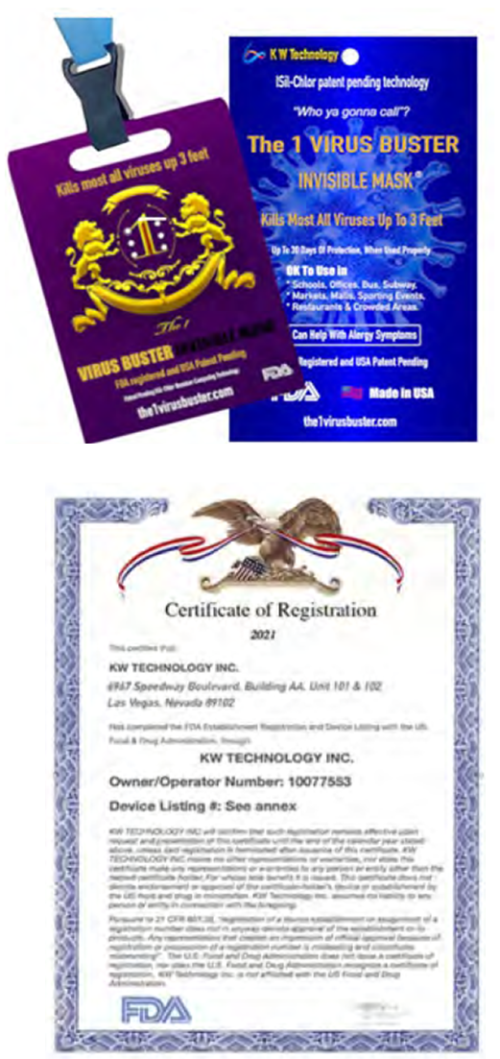According to a proposed settlement and a complaint filed by the FTC, two corporations, their President, and their CEO pitched a product called 1Virus Buster Invisible Mask, claiming that wearing the badge-like gizmo around the neck would create a three-foot barrier against 99.99% of viruses and bacteria, including COVID-19. But from the FTC’s perspective, the only thing invisible about Invisible Mask was scientific evidence supporting its claims.
The substantiation may not have been visible, but the defendants’ promises to consumers were definitely up front and out there. According to one of the defendants’ websites:
The 1 Invisible Mask offers three feet of protection from airborne viruses including Covid 19. This added protection is needed when masks are removed in order to eat, drink and speak filling that void. The quantum science behind the technology allows for this protective barrier to shield against pathogens and viruses – including COVID 19 – for up to 30 days.
How could a badge worn around the neck protect consumers from COVID? The defendants explained it this way:
The light-weight pouch containing the invisible barrier sits lower than one’s face and clips onto the clothing or worn loosely around the neck similar to an ID badge. In this way, the area surrounding the head and face receives the benefit of this invisible, protective formula. A patent pending technology called Isil-Chlor ensures the science by backing up the positive, proven results of this one-of-a-kind virus killer as reliable, safe, harmless, and easy as 1-2-3 to use.

According to the complaint, the defendants further claimed to have scientific supported in the form of in vitro lab tests that supposedly evaluated the efficacy of the product against Staphylococcus aureus and a case study of 598 volunteers that purportedly measured the product’s “ability to kill viruses and bacteria and results on symptoms of allergies.” They also include on their websites a “Certificate of Registration” featuring the FDA’s logo.
That’s what the defendants said about their “quantum science,” but from the FTC’s perspective, their advertising claims reflected a quantum leap of logic unsupported by appropriate proof – or any approval from the FDA. What about that FDA “Certificate of Registration”? According to the complaint, “Defendants' certificate is fake. The FDA does not issue certificates of registration to manufacturers of medical devices.”
This isn’t the first time the defendants has heard from the FTC about their representations. An earlier FTC warning letter advised them, “[A]ny coronavirus-related prevention or treatment claims regarding such products are not supported by competent and reliable scientific evidence. You must immediately cease making all such claims.”
Three defendants – Gary Kong, K W Technology Inc. and K W Technology NV Inc. – have entered into a proposed settlement, which prohibits misrepresentations about the health, safety, or efficacy of any product; bans bogus claims of government approval or clearance; and imposes a $150,000 financial remedy. Litigation continues against defendant Timothy Wetzel.
Read the FTC’s Health Products Compliance Guide for more about substantiating health claims.

It is your choice whether to submit a comment. If you do, you must create a user name, or we will not post your comment. The Federal Trade Commission Act authorizes this information collection for purposes of managing online comments. Comments and user names are part of the Federal Trade Commission’s (FTC) public records system, and user names also are part of the FTC’s computer user records system. We may routinely use these records as described in the FTC’s Privacy Act system notices. For more information on how the FTC handles information that we collect, please read our privacy policy.
The purpose of this blog and its comments section is to inform readers about Federal Trade Commission activity, and share information to help them avoid, report, and recover from fraud, scams, and bad business practices. Your thoughts, ideas, and concerns are welcome, and we encourage comments. But keep in mind, this is a moderated blog. We review all comments before they are posted, and we won’t post comments that don’t comply with our commenting policy. We expect commenters to treat each other and the blog writers with respect.
We don't edit comments to remove objectionable content, so please ensure that your comment contains none of the above. The comments posted on this blog become part of the public domain. To protect your privacy and the privacy of other people, please do not include personal information. Opinions in comments that appear in this blog belong to the individuals who expressed them. They do not belong to or represent views of the Federal Trade Commission.